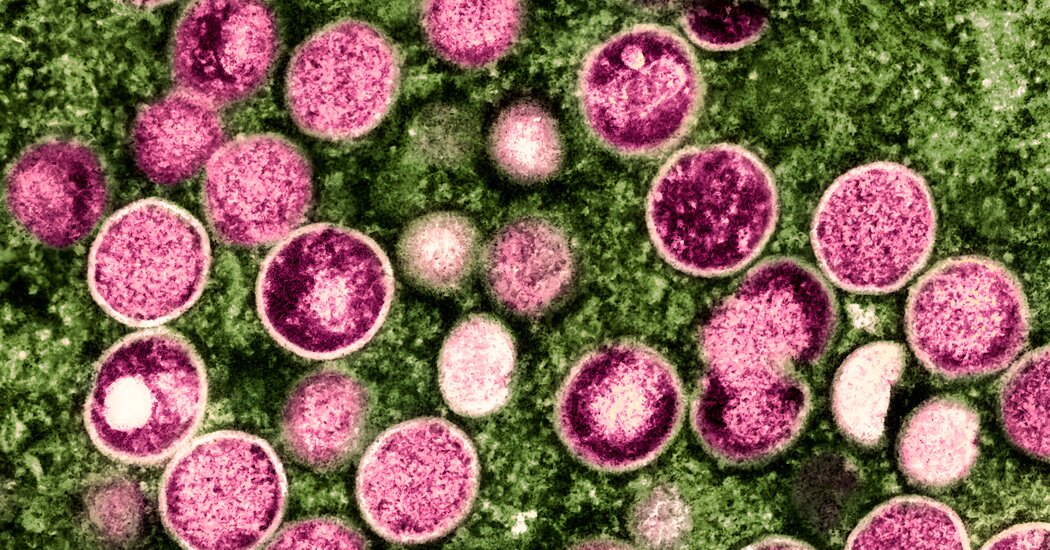
The World Health Organization, responding to complaints that the word monkeypox conjures up racist tropes and stigmatizes patients, is recommending that the name of the disease be changed to mpox. Both names are to be used for a year until monkeypox is phased out.
The recommendation, issued on Monday, follows outbreaks that began about six months ago in Europe and United States, prompting widespread fears that the pathogen could spread widely across the globe.
The virus had quietly circulated in rural parts of Central Africa and West Africa for decades, but in recent months most of those who contracted the disease were men who had sex with men on other continents, compounding the stigma of a community long burdened by its association with AIDS.
The new name was the result of a monthslong review process that included experts from around the world and input from the general public.
“W.H.O. will adopt the term mpox in its communications, and encourages others to follow these recommendations, to minimize any ongoing negative impact of the current name and from adoption of the new name,” the health organization said in a statement.
What to Know About the Monkeypox Virus
What is monkeypox? Monkeypox is a virus similar to smallpox, but symptoms are less severe. It was discovered in 1958, after outbreaks occurred in monkeys kept for research. The virus was primarily found in parts of Central and West Africa, but recently it has spread to dozens of countries and infected tens of thousands of people, overwhelmingly men who have sex with men.
Monkeypox was always a bit of a misnomer, because monkeys have almost nothing to do with the disease and its transmission. (Rats are the most likely animal reservoir for the virus.)
The name was inspired by a colony of caged lab monkeys in Denmark, where the virus was first identified by researchers more than a half-century ago. Since 2015, the W.H.O. has promoted new criteria for naming infectious diseases. According to the recommendations, names should aim to reduce unnecessary negative impact on travel, tourism or animal welfare, and “avoid causing offense to any cultural, social, national, regional, professional or ethnic groups.”
Critics said monkeypox reinforced ugly Western stereotypes about Africa as a reservoir of pestilence and sexually transmitted pathogens. Some critics said it also played into racist stereotypes, deeply rooted in American culture, that compare Black people to primates.
“Names matter, and so does scientific accuracy, especially for pathogens and epidemics that we are trying to control,” Tulio de Oliveira, a bioinformatician at Stellenbosch University in South Africa, said last summer as researchers campaigned for the W.H.O. to adopt a new name.
An open letter by Dr. de Oliveira and two dozen other African scientists warned that the failure to find less problematic nomenclature would hamstring efforts to contain the disease.
Critics also took aim at media coverage of the outbreak, noting that some Western outlets had initially selected photos of lesion-pocked Africans to illustrate an outbreak that was almost entirely affecting white men.
Before this year’s outbreak, human-to-human transmission in Africa was relatively uncommon, with most infections occurring in rural areas among people who had direct contact with wild animals. The disease can cause high fevers, painful rashes and lesions, but is seldom fatal.
“In the context of the current global outbreak, continued reference to and nomenclature of this virus being African is not only inaccurate but is also discriminatory and stigmatizing,” the letter said.
The word monkeypox will not disappear entirely. It will remain searchable in the International Classification of Diseases, allowing access to historical information about the disease, the W.H.O. said.
Despite its high-profile debut in the United States and in Europe, mpox has largely faded as a serious public health threat as cases have plummeted.
According to the Centers for Disease Control and Prevention, there have been 28,248 cases and 14 deaths since the outbreak first began last spring. In November, there were a dozen or so reported cases each day across the country, down from more than 400 cases last August.
Ultimately, the pathogen remained within a narrow demographic of gay and bisexual men, especially those with multiple partners.
The drop in new infections has been tied to a shift in sexual behavior, the widespread availability of vaccines, and a lucky break of sorts: The virus requires close contact to spread, making it easier to contain that its more deadly and transmissible viral cousin, SARS-CoV-2.



